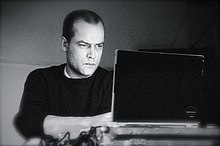Marcus Schmickler
Marcus Schmickler | |
|---|---|
 | |
| Background information | |
| Birth name | Marcus Schmickler |
| Also known as | Pluramon |
| Born | November 15, 1968 Cologne, Germany |
| Origin | Cologne, Germany |
| Genres | Contemporary classical music, Computer music, Postmodernism, New Complexity, New Simplicity |
| Occupation(s) | composer, producer |
| Labels | A-Musik, Mille Plateaux, Editions Mego |
| Website | www.piethopraxis.org |
Marcus Schmickler (born November 15, 1968, in Cologne) is a German composer, musician, and producer. He is also known under the pseudonym Pluramon.
Background[edit]
In 1968 he was born as the son of an industrial salesman and a baker's daughter in Cologne. Soon his parents moved to Kuerten where he met the music of Karlheinz Stockhausen. In 1991, after spending a year in London, he started studying music in Cologne and became a member of the seminal collective Kontakta. 1992 his first solo release appeared with the French label Odd Size. In 1995, he was co-initiator of the DJ collective Brüsseler-Platz-10a-Musik, together with Georg Odijk and Jan St. Werner (Mouse on Mars), associated with the A-Musik record store and label. A-Musik became his main record label since 1996.
Since 1995 he works as a composer, for film[1][2] theater[3] and radio play.[4] In 1996 he released one of the first fully digitally produced post-rock albums under the pseudonym Pluramon on the German label Mille Plateaux. After a concert in Cologne, in 1998, he became a member of the 12-piece electro-acoustic ensemble MIMEO (Music in Movement Electronic Orchestra). In 1999, he completed his studies in electronic music with Hans Ulrich Humpert and the composition with Johannes Fritsch with a thesis on Gottfried Michael Koenig.
In 2000 he published jointly with Thomas Lehn the CD Bart, which was reviewed to be one of the most impressive synth-improv performances ever.[5] In September 2001 he recorded the Pluramon album Dreams Top Rock with American singer Julee Cruise and went on an extended tour through South America on the initiative of Goethe-Institut in 2003. Since 2004 he has been working on various theater projects, with among others, Felix Ensslin [citation needed]. He created numerous works of electronic music, and compositions for choir, chamber ensemble, and orchestra. In 2009 he composed Bonn Patternizationon on behalf of the International Year of Astronomy 2009 and the German Music Council, a sonification with projections based on astrophysical data[citation needed]. Since 2015, Schmickler has worked as faculty at Bard College in Annandale-On-Hudson,[6] at California Institute for the Arts in Los Angeles County and the Institute For Music and Media in Düsseldorf.
Marcus Schmickler has received prizes and scholarships, including the Rome Prize of the German Academy Villa Massimo, Ars Electronica,[7] the state of North Rhine-Westphalia[citation needed] and curated festival programs in the Academy of Arts, Berlin[citation needed] and the ZKM[citation needed]. He was a longtime member of the jury of the Deutscher Musikrat (German Music Council, a member of the International Music Council). As an author, he wrote articles on various topics of electronic music.[8][9]
Partial discography[edit]
|
|
References[edit]
- ^ de:Der große Ausverkauf Der große Ausverkauf
- ^ [1] Die Anwälte, eine deutsche Geschichte
- ^ "Felix Ensslin inszeniert "Die Räuber" in Weimar | Metropolis, Samstag ab 17.30 Uhr | Kultur entdecken | de - ARTE". Archived from the original on 2012-04-03. Retrieved 2010-10-27. ARTE Felix Ensslin inszeniert „Die Räuber“ in Weimar
- ^ [2] WDR3 Akustische Kunst: E-UROPAS
- ^ [3] Archived 2011-07-20 at the Wayback Machine Published in Spex, Oktober 2008
- ^ [4]
- ^ "ARS Electronica | Prix Ars Electronica". Archived from the original on 2012-01-22. Retrieved 2011-08-23.
- ^ [5] kunstMusik: Autorenliste
- ^ [6] Ensslin, Blumenstein: zwischen zwei toden
External links[edit]
- http://www.piethopraxis.org/ Official Site
- Homepage of Pluramon
- Faculty home page
- Marcus Schmickler exclusive generative audio piece for the Composing with process series on Ràdio Web MACBA
- Marcus Schmickler's "Ontology of vibration: economics, music and number" podcast on Ràdio Web MACBA
- Marcus Schmickler discography at Discogs
- Marcus Schmickler at IMDb
